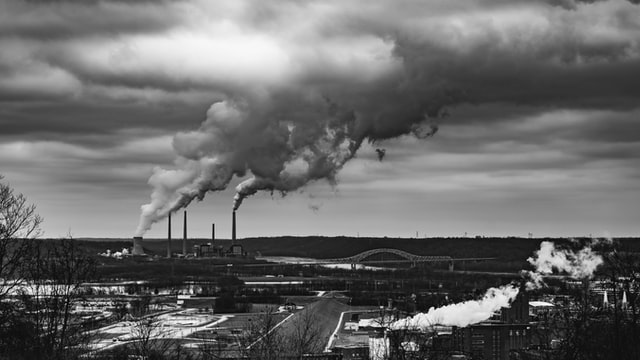The Invisible Killer

“Has the video started?” says Ella Kissi-Debrah as she gleams at the camcorder with a wide toothed grin. Behind the camera is Rosamund Kissi-Debrah, her mother, with the same grin
spread across her face. Ella was as happy and healthy as a six year old could be. She loved swimming and practicing gymnastics, always trying her best and putting her all into anything she did. She loved her caring and strong mother, and wanted to be just like her when she grew up.
She died at the age of nine due to severe asthma developed at age seven.
For over two years, Ella suffered severe seizures, had 27 hospital visits, and was resuscitated over 30 times. Rosamund felt helpless. Ella wasn’t born with asthma and was very active before diagnosis. This seemed completely out of the norm for a girl like Ella. After doing
some research, Rosamund found the killer, who was only 25 meters away from their home.
The Debrahs lived in Lewisham, a part of South East London, just next to the South Circular Road, a busy intersection that experienced heavy vehicle traffic daily, causing the air pollution to spike above the legal limit worsening Ella’s asthmatic symptoms.
While the story of Ella Kissi-Debrah is undoubtedly tragic, her story is only one of millions. According to the WHO, over 7 million premature deaths are due to air pollution. In Ella’s case, the poor air quality in her area exacerbated asthmatic symptoms and might have also
caused her asthma. For others, poor air quality increases the risk of developing heart disease, lung cancer, and can even lead to kidney failure.
Personally, I’ve experienced these effects first hand. I was born and raised in California, its sandy beaches and blue skies are almost all I can remember. This, however, has changed in recent years. With the increased wildfires due to constant drought in California, the air quality has decreased significantly. The normal blue skies have turned into a noxious orange haze and morning fog replaced with smoke that smells of cigarettes. For us Californians, these effects only last for a couple weeks, a month at most, but for others, especially in low to middle income countries, the impacts of poor air quality is felt on a day to day basis.
Take for example, Kanpur, a city in India which has an average air quality index of 160(a healthy air quality is rated from 0-50). Such dangerous air is a result of multiple different factors, the main of which being factory based pollutants. The hospitals in Kanpur are constantly full and the number of patients the hospital receives with respiratory illnesses has reached 600 monthly. For environmental officers in Kanpur, they aren’t receiving any governmental help to
deal with their issue of air quality. Unlike other big cities in India, Kanpur lacks the infrastructure to deal with its poor air quality, and would need five more air quality stations to monitor the air quality. However, with the development of coronavirus and people using vehicles
and working less, the air quality is slowly improving and many hope that this momentum will carry until after the coronavirus subsides. On the other hand, this is an example of environmental
issues disproportionately affecting marginalized groups.
This is evident in cities such as Chicago, where low income families are more likely to live near busy roads or intersections, thus becoming more prone to air pollution related diseases. For those living in richer neighborhoods, the effects of air pollution are much lighter and they are much better equipped to deal with the health problems caused by pollution. This is part of a much greater issue known as Environmental Racism: the idea that global warming and climate change disproportionately affects people of color as a result of residential segregation. A recent EPA report found that people who live in predominantly black or African American communities were far more likely to die from particle pollution than that of predominantly white communities.
While not all of us have
experienced the effects of air pollution first hand, this is an overarching issue that will affect all of us, sooner or later, and we must remember that we are all in the same boat. The issue of global warming is not to be blamed on China or India, but a global issue that we must all work towards to solve. Families like the Debrahs are counting on you to put your chip in to help save the planet and each other as well. I am asking you to rethink your impact on the planet and whether or not you are contributing to the issue, or working to solve it. Even actions as simple as opening a window instead of turning on the AC or biking to work or school instead of driving helps against our global fight against climate change. For many who live in marginalized groups, your contribution is a matter of life or death to them.
Works Cited
“Air Pollution.” World Health Organization, World Health Organization,
www.who.int/health-topics/air-pollution.
Chappell, Carmin. “Climate Change in the US Will Hurt Poor People the Most, According to a
Bombshell Federal Report.” CNBC, CNBC, 27 Nov. 2018,
www.cnbc.com/2018/11/26/climate-change-will-hurt-poor-people-the-most-federal-repor
t.html.
Dasgupta, Neha. “With World’s Worst Air, Kanpur Struggles to Track Pollution.” Reuters,
Thomson Reuters, 16 May 2018,
in.reuters.com/article/health-pollution-india-kanpur/with-worlds-worst-air-kanpur-struggl
es-to-track-pollution-idINKCN1IG1AN.
“Disparities in the Impact of Air Pollution.” American Lung Association, 20 Apr. 2020,
www.lung.org/clean-air/outdoors/who-is-at-risk/disparities.
“Ella Kissi-Debrah: New Inquest into Girl’s ‘Pollution’ Death.” BBC News, BBC, 2 May 2019,
www.bbc.com/news/uk-england-london-48132490.